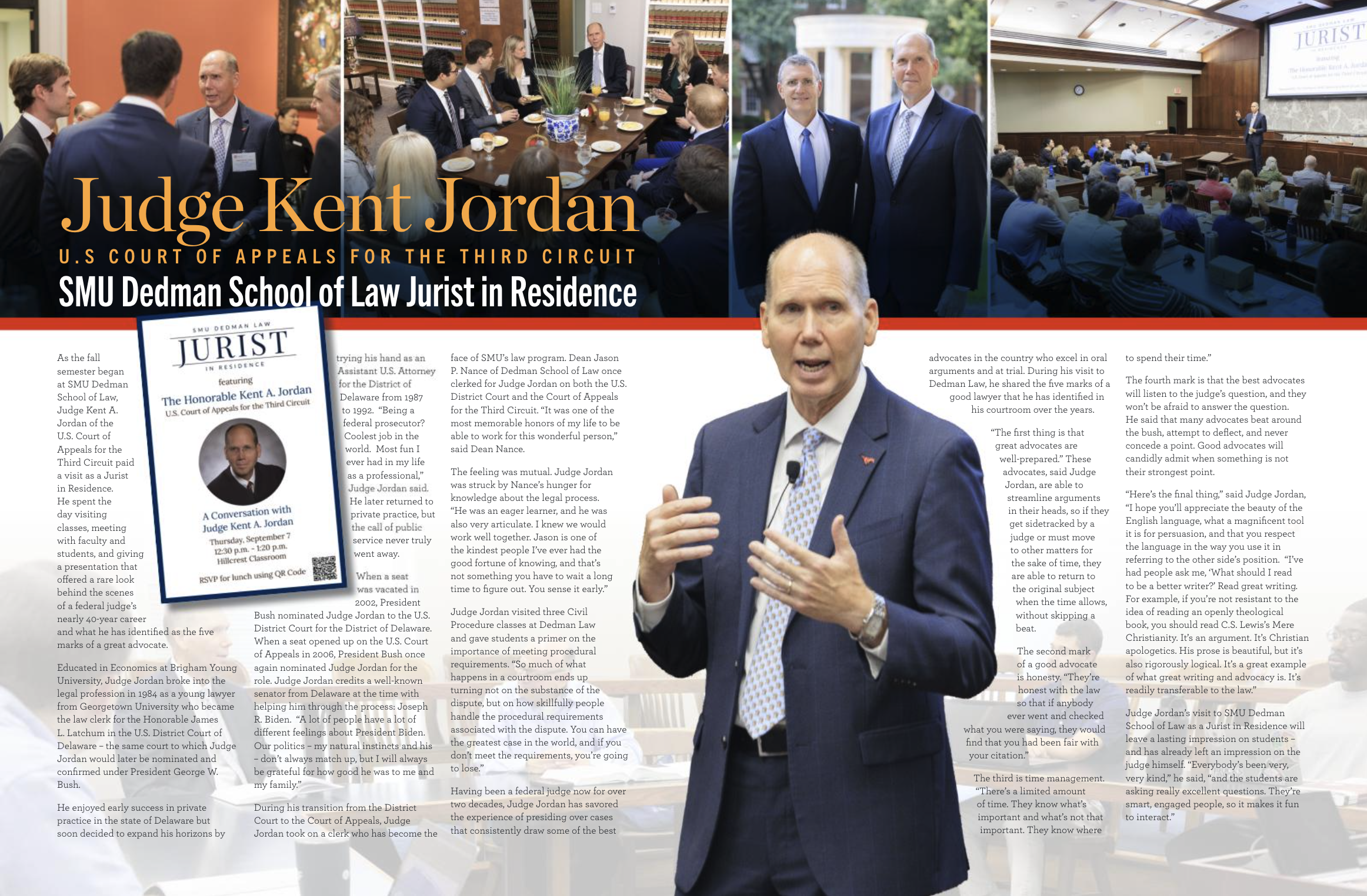Jurist in Residence: Judge Kent A. Jordan

As the fall semester began at SMU Dedman School of Law, Judge Kent A. Jordan of the U.S. Court of Appeals for the Third Circuit paid a visit as a Jurist in Residence. He spent the day visiting classes, meeting with faculty and students, and giving a presentation that offered a rare look behind the scenes of a federal judge’s nearly 40-year career and what he has identified as the five marks of a great advocate.
Educated in Economics at Brigham Young University, Judge Jordan broke into the legal profession in 1984 as a young lawyer from Georgetown University who became the law clerk for the Honorable James L. Latchum in the U.S. District Court of Delaware – the same court to which Judge Jordan would later be nominated and confirmed under President George W. Bush.
He enjoyed early success in private practice in the state of Delaware but soon decided to expand his horizons by trying his hand as an Assistant U.S. Attorney for the District of Delaware from 1987 to 1992. “Being a federal prosecutor? Coolest job in the world. Most fun I ever had in my life as a professional,” Judge Jordan said. He later returned to private practice, but the call of public service never truly went away.
When a seat was vacated in 2002, President Bush nominated Judge Jordan to the U.S. District Court for the District of Delaware. When a seat opened up on the U.S. Court of Appeals in 2006, President Bush once again nominated Judge Jordan for the role. Judge Jordan credits a well-known senator from Delaware at the time with helping him through the process: Joseph R. Biden. “A lot of people have a lot of different feelings about President Biden. Our politics – my natural instincts and his – don’t always match up, but I will always be grateful for how good he was to me and my family.”
During his transition from the District Court to the Court of Appeals, Judge Jordan took on a clerk who has become the face of SMU’s law program. Dean Jason P. Nance of Dedman School of Law once clerked for Judge Jordan on both the U.S. District Court and the Court of Appeals for the Third Circuit. “It was one of the most memorable honors of my life to be able to work for this wonderful person,” said Dean Nance.
The feeling was mutual. Judge Jordan was struck by Nance’s hunger for knowledge about the legal process. “He was an eager learner, and he was also very articulate. I knew we would work well together. Jason is one of the kindest people I've ever had the good fortune of knowing, and that's not something you have to wait a long time to figure out. You sense it early.”
Judge Jordan visited three Civil Procedure classes at Dedman Law and gave students a primer on the importance of meeting procedural requirements. “So much of what happens in a courtroom ends up turning not on the substance of the dispute, but on how skillfully people handle the procedural requirements associated with the dispute. You can have the greatest case in the world, and if you don’t meet the requirements, you’re going to lose.”
Having been a federal judge now for over two decades, Judge Jordan has savored the experience of presiding over cases that consistently draw some of the best advocates in the country who excel in oral arguments and at trial. During his visit to Dedman Law, he shared the five marks of a good lawyer that he has identified in his courtroom over the years.
“The first thing is that great advocates are well-prepared.” These advocates, said Judge Jordan, are able to streamline arguments in their heads, so if they get sidetracked by a judge or must move to other matters for the sake of time, they are able to return to the original subject when the time allows, without skipping a beat.
The second mark of a good advocate is honesty. “They’re honest with the law so that if anybody ever went and checked what you were saying, they would find that you had been fair with your citation.”
The third is time management. “There’s a limited amount of time. They know what’s important and what’s not that important. They know where to spend their time.”
The fourth mark is that the best advocates will listen to the judge’s question, and they won’t be afraid to answer the question. He said that many advocates beat around the bush, attempt to deflect, and never concede a point. Good advocates will candidly admit when something is not their strongest point.
“Here’s the final thing,” said Judge Jordan, “I hope you’ll appreciate the beauty of the English language, what a magnificent tool it is for persuasion, and that you respect the language in the way you use it in referring to the other side’s position. “I’ve had people ask me, ‘What should I read to be a better writer?’ Read great writing. For example, if you’re not resistant to the idea of reading an openly theological book, you should read C.S. Lewis’s Mere Christianity. It’s an argument. It’s Christian apologetics. His prose is beautiful, but it’s also rigorously logical. It’s a great example of what great writing and advocacy is. It’s readily transferable to the law.”
Judge Jordan’s visit to SMU Dedman School of Law as a Jurist in Residence will leave a lasting impression on students – and has already left an impression on the judge himself. “Everybody’s been very, very kind,” he said, “and the students are asking really excellent questions. They’re smart, engaged people, so it makes it fun to interact.”